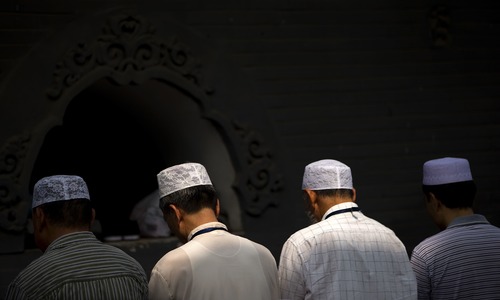WEIZHOU: Authorities in northern China delayed the demolition of a large mosque on Saturday after thousands of people demonstrated to stop its destruction, local residents said, amid a nationwide government drive to tighten restrictions on religious activities.
Across China, officials have sought to limit religious freedoms for Muslims as part of a widespread attempt to bring believers in line with the dictates of the ruling Communist Party.
Protesters began gathering on Thursday ahead of a deadline to demolish the grand mosque in the town of Weizhou in the northern Ningxia region, locals said.
Chinese leaders have urged ‘Sinicisation’ of religious practice, bringing it in line with traditional values and culture
Videos posted on social media in recent days showed protesters gathering in front of the building as police with riot shields stood by.
Holding Chinese flags, they sat quietly on the building’s steps and milled around a large plaza, before heading to Friday night prayers, according to the videos.
“The government said it’s an illegal building, but it’s not. The mosque has several hundred years of history,” a restaurant owner surnamed Ma said.
Around noon on Saturday, a local official had read a document, saying that the government would hold off on the mosque’s demolition.
After that, many who had participated in the sit-in dispersed.
Internet down
People had come hundreds of kilometres from other Muslim regions to show support and bring food to those in Weizhou, locals said.
Hundreds of security forces had at one point been brought in on civilian buses to secure a perimeter around the area, not allowing outsiders in.
Internet and 4G mobile phone service had been cut off to the area, resuming only some 14 kilometres away from Weizhou though residents could still make phone calls.
On Saturday evening, a few dozen people sat on folded stools or leaned against their motorbikes in another neighbourhood away from the mosque, watching a movie projected onto a cement wall near a petrol station.
Police cars occasionally drove past, lights flashing, but it was otherwise peaceful.
“They told us the internet was down because of recent rains, but does that really make sense?” said a young man straddling his bike.
“They are afraid of us spreading videos,” he said.
Sinicisation of religion
Islam is one of five officially recognised religions in China, home to some 23 million Muslims.
Pressure has been building on the community in recent months as the Communist party moves to tighten the reins on religious expression.
China’s top leaders recently called for the “Sinicisation” of religious practice — bringing it in line with “traditional” Chinese values and culture — and new regulations on religious affairs came into effect in February, sparking concern among rights groups.
The measures increased state supervision of religion in a bid to “block extremism”, and in areas with significant Muslim populations, authorities have removed Islamic symbols, such as crescents, from public spaces.
In the far western region of Xinjiang, things have gone much farther, with Muslims being harshly punished for violating regulations banning beards and burqas.
Published in Dawn, August 12th, 2018














































